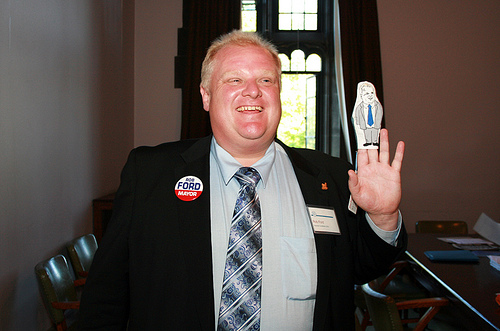You can change the conversation. Chip in to rabble’s donation drive today!
The current video travelling across mass and social media outlets with Toronto mayor Rob Ford speaking Jamaican might serve to enhance his image as a down-to-earth guy, in spite of the chief magistrate being a member of a multi-millionaire political family. Life in a consumerist society is increasingly a spectacle and even politics has taken on that character.
However, this development ought not to discourage us from critically examining relevant issues such as politicians being friends of socially marginalized groups in society. It is surprising though that the media would treat Rob Fords’ appropriation of the Jamaican language as a new phenomenon. Isn’t it very natural for politicians to adapt the language of the common folks in order to gain their popular support? Pastors are infamously known to take on this approach to increase their congregation and Ford like a sly politician has even slithered his way onto the black church scene in Toronto.
The media’s criticism of Ford’s appropriation of Jamaican comes even as a bigger surprise. Since when has the media or politicians in Toronto ever been a defender of Jamaicans, or the black community for that matter? Are these not the same institutions that have routinely used demeaning images to characterize our community and to assist in criminalizing black male bodies?
In 2008, as some members of the community tirelessly mobilized to establish an Africentric school, I can recall vividly the demeaning cartoon caricature featured in The Globe and Mail to ridicule what would be the outcome of a black-focus education. No doubt the image was that of the typical exaggerated black face with enormous lips and wide eyes. A caption with the African American slang “S’up dawg?” was also placed over the image and in the background a blackboard displaying incorrect mathematical equations; many logically read the buffoonery image as the stereotype that blacks were mentally inferior and therefore not equipped to run a school of their own. Surely, this image infuriated many members within the black communities while the media and politicians sat quietly and watched on.
More recently, the Somali community has been the target of media misrepresentation. With the ongoing Rob Ford saga this community replaced the usual Jamaican depiction of gangsters and became the new thugs of Toronto streets. Indeed, the Somali-Canadians are no strangers to negative portrayal of their communities. In the past the media has unfairly portrayed this group as unlawful refugees abusing Canada’s dear social system.
Rob Ford himself has also helped to communicate some of these messages. Let us not forget his call for deportation and of draconian criminal justice measures after the Danzig shooting (assuming the perpetrator[s] of gang violent were all foreign born) or his no hug-a-thug approach that was targeted in the same neighbourhoods he brags about having access to in the YouTube clip.
I could point to the exhaustive list of bias news reports and racially charged images of the black community that have paraded across Canadian television screens and newspapers. However, I think my message is quite clear.
Let us therefore not fall prey to the media’s manipulation and become too offended by Rob Ford’s rambling in Jamaican. As a language educator and native speaker, Ford’s appropriation of Jamaican was not offensive. I have seen worst (mis)appropriation of the language loaded with stereotypes and they have gone unchallenged by these same institutions.
Clearly, through his political hustling, Ford has managed to acquire aspects of the Jamaican semantics and unfortunately garner lots of support within this community because of his packaged “keeping it real” personality. In a very conversational tone Ford is seen sharing his version of a story using Jamaican and what better way to “keep it real with your friends” but to converse in the language of the people.
What is offensive and should be of concern to our community is Rob Ford’s white male privilege that allows him to stay in office despite his repeated misconduct in public and his tireless apologies/deceptions to the people of Toronto. Over the years we have seen what has happened to prominent black public figures who have committed less “offense” and how speedily they were removed from offices or forced out of positions of power.
Getting too got up into the argument of Rob Ford’s (mis)appropriation of Jamaican only derails the real issue at hand which is to challenge white supremacy and class privilege and how they allow men like Rob Ford to abuse their power without consequence. To my knowledge, Human Rights lawyer Selwyn Pieter is the only person I have heard to publicly address this double standard.
Other more pertinent issues that need to be of concern are whether or not Rob Ford’s solidarity with the marginalized linguistic community will lead to his support for a higher subsidy for the Toronto Transit Commission, increased funding for social housing, reduction or elimination of user fees for the city’s recreational services, adequate funding for youth programmes, job creation programmes to deal with high rates of employment among Jamaican and other racialized, working-class youth and the elimination of carding and police racial profiling of the racialized community?
That would be keeping it real on substantive social issues or a better way to identify with oppressed communities.
Dr. Lisa Tomlinson is a Cultural Critic and Language Specialist. She is currently a Lecturer at University of Ontario Institute of Technology and a TESL Theory Instructor at Seneca College.
This post originally appeared on Huffington Post and is reprinted with the author’s permission.
Photo: flickr/Shaun Merritt




